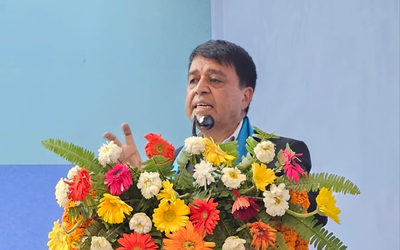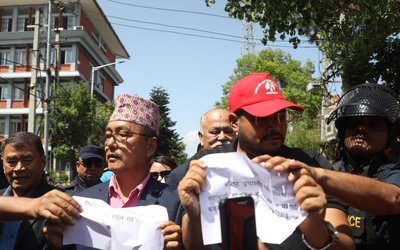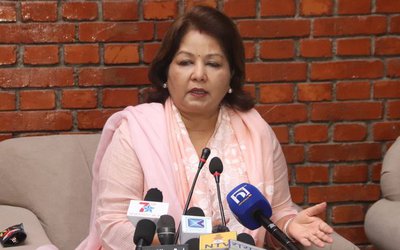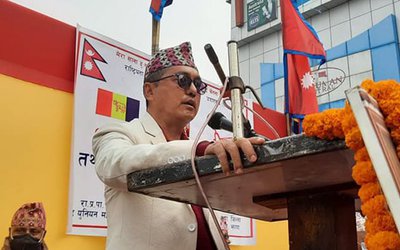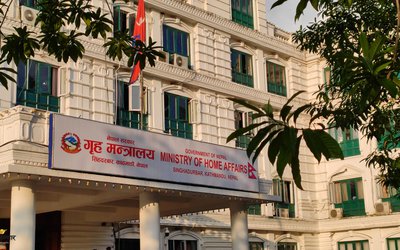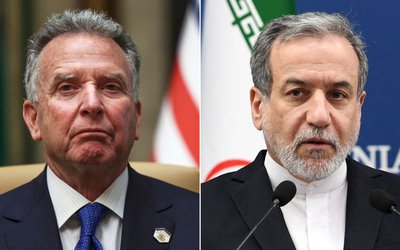
As Nepal has been in the process of strengthening and making new institutions, it needs efficient and specialized manpower trained to run such institutions.
Supporting Nepal’s development efforts, European Union has been playing a major role as a partner in the process. Providing scholarships to Nepalese young students for higher education in European Universities is one of these supports.
As in the past, 49 Nepalese students have received Erasmus+ scholarships to study in Europe. After acquiring higher education in Europe, these young Nepalese will return home to play an important role in Nepal.
The Delegation of the European Union to Nepal together with the Erasmus Mundus Association Nepal organized a Virtual Pre-Departure Orientation (PDO) for the new scholarship recipients of Erasmus Mundus Joint Master Degree (EMJMD) batch 2021-2023 on 20 July.
The Nepalese students have been awarded full scholarships for the period 2021-2023 and they will spend 2 years fulltime in prestigious European Universities to pursue their Master's Degrees in various fields. During the Pre-Departure Orientation, the students got useful tips and advice for living and studying in Europe.
The European Union is the largest global donor in education with its Erasmus+ program (2021-2027) budgeted at EUR 26.2 billion. This is nearly double the funding compared to its predecessor programme (2014-2020).
Welcoming the awardees, EU Ambassador to Nepal, H.E. Nona Deprez, said, “Erasmus is one of the most successful programmes of the European Union. People to people connectivity are one of the top priorities of the EU. This is one of the ways that we want to promote our values and share knowledge and experiences with all of you abroad and for all of us to become richer from the experience.”
“We hope that these scholarships will help these students to further excel and that they will return to Nepal with enhanced skills and knowledge useful for the country and themselves, as well as with fond memories of Europe," Ambassador Deprez said.
More than 700 Nepalese students have benefitted from the EU’s Erasmus+ Scholarship Programme. The Erasmus+ scholarships also provide opportunities for Europeans to undertake short-term studies and teaching in various universities across Nepal.
Shashank Khaniya, who has been provided the scholarship for Master's Degree in Sustainable Forest and Nature Management (SUFONAMA) said, "I feel really excited after getting news of selection for SUFONAMA program under Erasmus Mundus scholarship. The opportunity to learn from two different universities of Europe is really a lifetime experience for me. I hope to use my knowledge and skills from the program. Furthermore, opportunity to learn culture of the European nations is an added advantage for me." Khaniya will be undertaking his first year in University of Gottingen, Germany and second year in Swedish University of Agricultural Science, Sweden.
Another Erasmus+ Nepal awardees Pratikshya Shrestha said, "I am feeling really excited to start my Master's degree in the subject of my interest in one of the world's top Agriculture Universities where I shall get good practical exposure, be familiar with high level of technology and enhance my current abilities. I am hoping that I will be more of an asset to my nation upon returning.” Pratikshya will be pursuing Master's Degree in plant breeding. She will be studying at the SLU-Swedish University of Agriculture Sciences, Sweden and in BOKU-Austria.
Niranjan Khadka, Country Representative of Erasmus Mundus Association-Nepal, shared EMA Nepal's current activities and plans. "Due to Covid restrictions, we are working for the promotion of Erasmus scholarships in rural areas of Nepal through webinar by connecting with different colleges and universities. We are also equally focusing on strengthening the networking of EMA Nepal and building it as a common platform to share each other's experience and opportunity," said Khadka.
Pawan Dhakal, who is now doing his master's under Erasmus scholarship program in the UK, following a first semester in Italy, shared his experience of applying for visa after receiving the scholarship, travelling to Europe and getting to know the educational and cultural environment there.
Representatives of the EU Member State Embassies based in Kathmandu and New Delhi also participated in the programme and answered the queries of the students who are looking forward to begin their studies in different countries in Europe. Those present were Ms Katharina Wieser, Ambassador, and Embassy of Austria in New Delhi, Ms Eva Chmelikova, Third Secretary, and Embassy of the Czech Republic in New Delhi, Barked Kofi Scheutz First Secretary, Political and Economic Counsellor of the Royal Danish Embassy in New Delhi.
Stephane Russek, Chargé d’Affaires, Embassy of Germany in Nepal, Ms Sara Lages Range, Attaché, Embassy of Portugal in New Delhi and Dr. Gianluca Rubagotti, Italian Consul General based in Calcutta were also present at the orientation.
In addition to the Erasmus+ scholarships, the EU Delegation in Nepal has been providing ongoing support to the Government of Nepal/Ministry of Education, Science and Technology on Quality Education and Technical and Vocational Training.
Education has been a key component of the EU's financial assistance to Nepal since the late 1990s through the provision of sector budget support. The EU along with other donors supported the Government of Nepal to complete the School Sector Reform Programme (SSRP-2009-2016) and currently it has been supporting the School Sector Development Plan (SSDP), which aims at guiding the reform efforts of the government until 2023 in line with Nepal’s vision to graduate from least developed country status. Education is one of the major pillars of development cooperation for EU’s ongoing multiannual indicative programme (2021-2027) for Nepal.
Similarly, the EU support in TVET reform entails strengthening and more effectively implementing a TVET policy responsive to labour market needs, as well as piloting and integrating the Public Private Partnership (PPP) approach in three key economic sectors: agriculture, construction, and hospitality and tourism, in order to offer opportunities for promoting the transition to a greener, climate-resilient and low-emission economy. The TVET-PP is going forward to help reduce youth unemployment by improving access to relevant and high-quality TVET, which will increase their employability and provide them with better economic opportunities in the future.
- NEPAL-THAILAND: Joint Business Council
- Apr 13, 2025
- BIMSTEC SUMMIT: Nepal’s Stand
- Apr 11, 2025
- IME GROUP: Expands Into Paper Industry
- Mar 24, 2025
- CPN UML: Instigated By India
- Mar 23, 2025
- ADB’S CHIEF ECONOMIST: Nepal Reduces Poverty
- Mar 11, 2025






